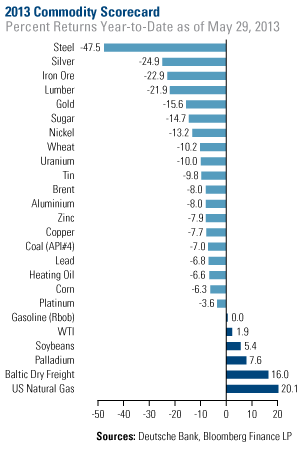Energy and Natural Resources Market Radar (June 10, 2013)
Strengths
- The price of crude oil (WTI) gained 4 percent this week to $96 a barrel on the back of a favorable jobs report, indicating further growth in the U.S. economy.
- U.S. scrap steel prices firmed toward the end of this week, with some settlements now reported at stable to up $15 per ton from early May deals. The improvement was due to lean inventories and a rise in lead times.
- The platinum price increased this week on fears of further supply disruption due to labor unrest in South Africa and improving demand.
Weaknesses
- The price for iron ore (63.5 percent FE) to China fell again, by $2 to $113-$114. Steel mill sources quoted on how the fundamentals throughout this volatile week were essentially unchanged and that sentiment was driving moves.
- Commodities remain the worst-performing asset class on a total returns basis since the end of last year. We believe commodities are feeling the strains posed by the scaling back in expectations towards quantitative easing by the Fed.
Opportunities
- BTU sees world coal demand rising to 7.95 billion metric tons this year (vs. 7.665 billion in 2012), and says Chinese and Indian coal imports may rise to 480 million metric tons (vs. 425 million in 2012). The company sees about 450 gigawatts of new coal fired power generation coming on stream by 2017, implying an additional 900 million metric tons of coal demand.
- A plummeting South African rand has meant South African platinum group metals miners are receiving a higher price for their metal than might be realized. This is providing some relief against the cost pressures facing the industry, and suggests a weaker dollar platinum price.
Threats
- Baosteel chairman Xu Lejiang said on Tuesday that the company sees Chinese steel production rising just 1-2 percent in 2013. Baosteel expects steel consumption to weaken into the third quarter, which will “force mills to be more rational in their production plans.”
- India's central bank, the Reserve Bank of India (RBI), announced new measures on Tuesday to reduce gold imports. The RBI extended its requirement, announced last month, that banks could only import gold on a consignment basis if it was for exporters of gold jewelry, to all nominated agencies/trading houses importing gold. It also put in place other restrictions about buying gold on a non-consignment basis.














